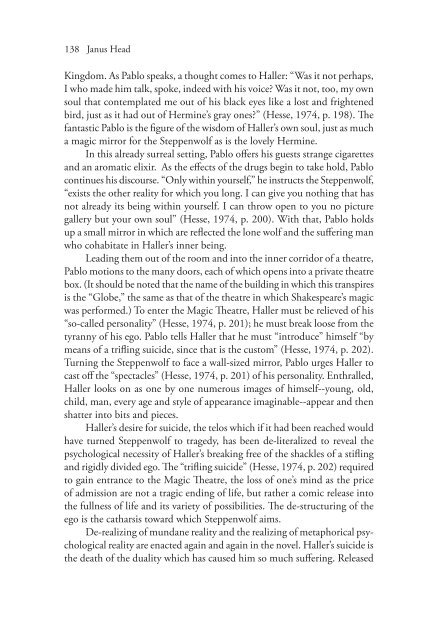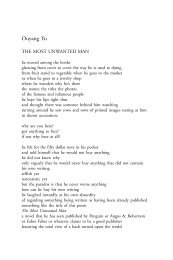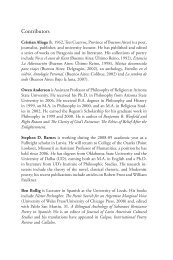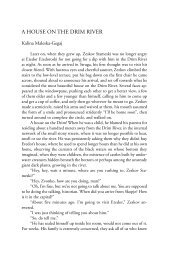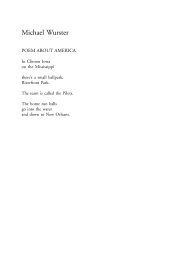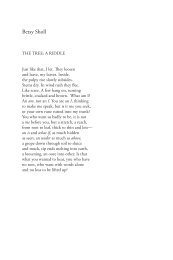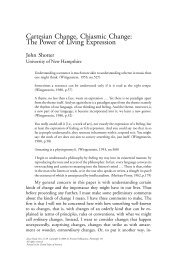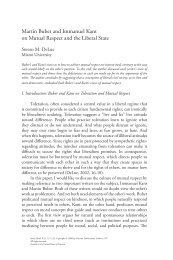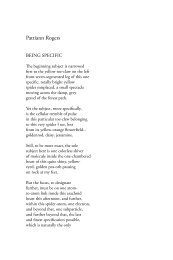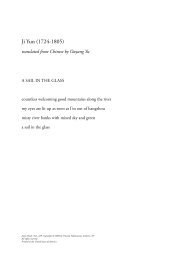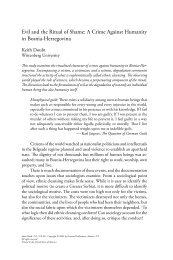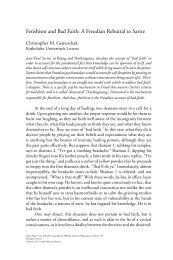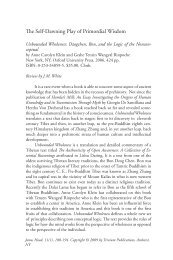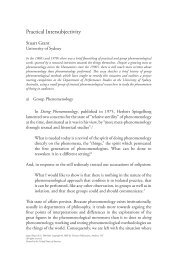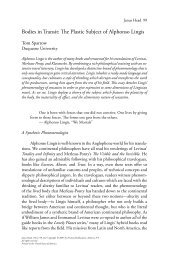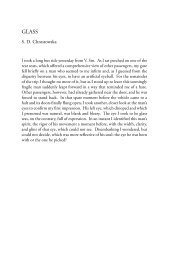Hesse's Steppenwolf: A Comic-Psychological ... - Janus Head
Hesse's Steppenwolf: A Comic-Psychological ... - Janus Head
Hesse's Steppenwolf: A Comic-Psychological ... - Janus Head
Create successful ePaper yourself
Turn your PDF publications into a flip-book with our unique Google optimized e-Paper software.
138 <strong>Janus</strong> <strong>Head</strong><br />
Kingdom. As Pablo speaks, a thought comes to Haller: “Was it not perhaps,<br />
I who made him talk, spoke, indeed with his voice? Was it not, too, my own<br />
soul that contemplated me out of his black eyes like a lost and frightened<br />
bird, just as it had out of Hermine’s gray ones?” (Hesse, 1974, p. 198). �e<br />
fantastic Pablo is the figure of the wisdom of Haller’s own soul, just as much<br />
a magic mirror for the <strong>Steppenwolf</strong> as is the lovely Hermine.<br />
In this already surreal setting, Pablo offers his guests strange cigarettes<br />
and an aromatic elixir. As the effects of the drugs begin to take hold, Pablo<br />
continues his discourse. “Only within yourself,” he instructs the <strong>Steppenwolf</strong>,<br />
“exists the other reality for which you long. I can give you nothing that has<br />
not already its being within yourself. I can throw open to you no picture<br />
gallery but your own soul” (Hesse, 1974, p. 200). With that, Pablo holds<br />
up a small mirror in which are reflected the lone wolf and the suffering man<br />
who cohabitate in Haller’s inner being.<br />
Leading them out of the room and into the inner corridor of a theatre,<br />
Pablo motions to the many doors, each of which opens into a private theatre<br />
box. (It should be noted that the name of the building in which this transpires<br />
is the “Globe,” the same as that of the theatre in which Shakespeare’s magic<br />
was performed.) To enter the Magic �eatre, Haller must be relieved of his<br />
“so-called personality” (Hesse, 1974, p. 201); he must break loose from the<br />
tyranny of his ego. Pablo tells Haller that he must “introduce” himself “by<br />
means of a trifling suicide, since that is the custom” (Hesse, 1974, p. 202).<br />
Turning the <strong>Steppenwolf</strong> to face a wall-sized mirror, Pablo urges Haller to<br />
cast off the “spectacles” (Hesse, 1974, p. 201) of his personality. Enthralled,<br />
Haller looks on as one by one numerous images of himself--young, old,<br />
child, man, every age and style of appearance imaginable--appear and then<br />
shatter into bits and pieces.<br />
Haller’s desire for suicide, the telos which if it had been reached would<br />
have turned <strong>Steppenwolf</strong> to tragedy, has been de-literalized to reveal the<br />
psychological necessity of Haller’s breaking free of the shackles of a stifling<br />
and rigidly divided ego. �e “trifling suicide” (Hesse, 1974, p. 202) required<br />
to gain entrance to the Magic �eatre, the loss of one’s mind as the price<br />
of admission are not a tragic ending of life, but rather a comic release into<br />
the fullness of life and its variety of possibilities. �e de-structuring of the<br />
ego is the catharsis toward which <strong>Steppenwolf</strong> aims.<br />
De-realizing of mundane reality and the realizing of metaphorical psychological<br />
reality are enacted again and again in the novel. Haller’s suicide is<br />
the death of the duality which has caused him so much suffering. Released


